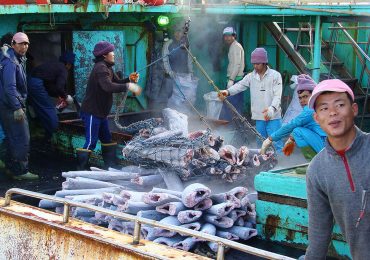PACIFIC OCEAN, Thursday, 5 June 2025 – Greenpeace activists have disrupted an industrial longlining fishing operation in the South Pacific Ocean, seizing almost 20 kilometers of fishing gear and freeing nine sharks, including an endangered mako[1], near Australia and New Zealand.
Crew aboard Greenpeace ship the Rainbow Warrior retrieved the entire longline and more than 210 baited hooks from a EU-flagged industrial fishing vessel. An expert team on a small boat, releasing more than a dozen animals, including an endangered longfin mako shark, eight near-threatened blue sharks[2] and four swordfish. The crew also documented the vessel catching endangered sharks during its longlining operation.
Greenpeace intercepted the vessel after it had left the Lord Howe Rise and South Tasman Sea region, where it had fished for more than 160 days over the last 12 months.
The at-sea action follows new Greenpeace Australia Pacific analysis exposing the extent of shark catch from industrial longlining in parts of the Pacific Ocean. Latest fisheries data showed that almost 70% of EU vessels’ catch was blue shark in 2023 alone[3]. It comes ahead of next week’s UN Ocean Conference in Nice, France, where world leaders will discuss ocean protection and the Global Ocean Treaty.
Georgia Whitaker, Senior Campaigner, Greenpeace Australia Pacific, said:
“These longliners are industrial killing machines. Greenpeace Australia Pacific took peaceful and direct action to disrupt this attack on marine life. We saved important species that would otherwise have been killed or left to die on hooks.”
“The scale of industrial fishing – still legal on the high seas – is astronomical. These vessels claim to be targeting swordfish or tuna, but we witnessed shark after shark being hauled up by these industrial fleets, including three endangered sharks in just half an hour. Greenpeace is calling on world leaders at the UN Ocean Conference to protect 30 percent of the world’s oceans by 2030 from this wanton destruction.”
Greenpeace Australia Pacific is calling on Environment Minister Murray Watt to ratify the Global Ocean Treaty in the first 100 days of government, and to propose large marine sanctuaries, including in the Tasman Sea between Australia and New Zealand. Australia signed the treaty in 2023.
More than two-thirds of sharks worldwide are endangered, and a third of those are at risk of extinction from overfishing[4]. Over the last three weeks, the Rainbow Warrior has been documenting longlining vessels and practices off Australia’s east coast, including from Spain and China.
—ENDS—
Greenpeace Australia Pacific media team: +61 407 581 404 or kbernard@greenpeace.org
Greenpeace International Press Desk: +31 (0)20 718 2470 (available 24 hours), pressdesk.int@greenpeace.org
Notes to Editor
High res images and footage can be found here
A new report in Nature overnight has outlined the importance of protecting the high seas
[1] https://www.iucnredlist.org/species/39341/2903170
[2] https://www.iucnredlist.org/species/39381/2915850
[3] https://meetings.wcpfc.int/node/22532
[4] https://iucn.org/press-release/202412/third-sharks-rays-and-chimaeras-are-threatened-extinction-new-report-narrows
Leave a comment



